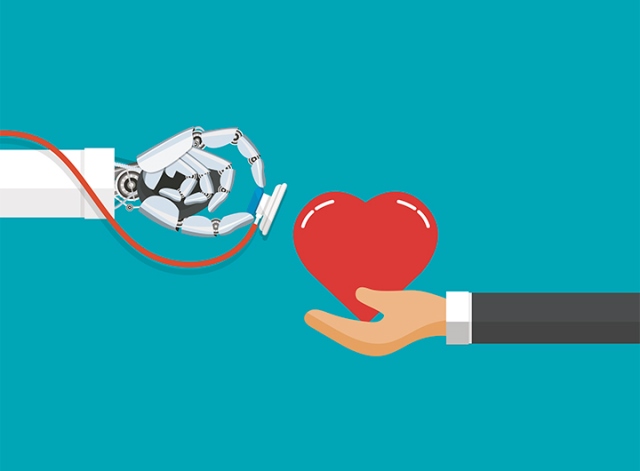By Dr. Naila Kassam
Healthcare innovation has traditionally been the cornerstone of improved patient care. The most significant advancements in medicine, for example, include the development of anesthesia, antibiotics and radiography. When future societies look back at our current era, artificial (or augmented) intelligence (AI) will find itself on a list of major technologies known to further medical care in its history.
Artificial intelligence is the concept of machine learning that was popularized by Geoffrey Hinton, a computer scientist who is a professor at the University of Toronto, who is considered the godfather of deep-learning. By creating software that assembles computers in networks that mimic the architecture of the human brain, Dr. Hinton has been able to create environments for computers to learn in similar ways as humans do. Once a relatively obscure field of computing, AI is now being touted as the next big thing in many industries.
AI has already made significant progress and attracted global attention in areas including autonomous driving, as well as face and voice recognition, which are currently being developed and perfected by companies like Tesla, Apple and Google. Governments also appear to be enthused on the economic future of computer learning, which was illustrated by the federal government’s recent commitment of $125-million to the Pan-Canadian Artificial Intelligence Strategy. This is in addition to the highly anticipated Vector Institute for Artificial Intelligence in Toronto, whose chief scientific advisor is Professor Hinton.
As tech entrepreneurs continue to refine AI technology, healthcare leaders should consider developing strong partnerships with these experts. Indeed, the applications for AI in healthcare are numerous; what remains to be seen is whether the healthcare industry will be receptive to technological disruption despite its usual apprehension to change. What is clear is that AI technology has the potential to improve the three key pillars of comprehensive medical care: prevention, intervention, and rehabilitation.
Prevention has become increasingly important over the last several decades as healthcare providers and institutions have achieved improved patient outcomes as a result of an increase in focus on disease prevention. Chronic diseases such as heart disease and diabetes are also costly to manage as a health care system. Therefore, the combination of improved quality of life for patients and system efficiency has aligned physicians and policy experts with the mutual goal of building a robust healthcare prevention infrastructure. Artificial intelligence could be the perfect tool for this.
Researchers combine wearable technology and AI to predict the onset of health problems
As AI technology becomes more sophisticated, patients will be able to better predict what kinds of health care resources they will need to access. Aggregate population data can also be used to plan for the types of healthcare utilization that will occur in different neighbourhoods, thus allowing sustainable policy to make the proper investments for the future. More concretely, AI can help predict which patients are at risk for falls or hospitalizations based on their personalized healthcare data, allowing for early, effective, and less costly intervention.
AI can also help to intervene by reminding patients to take medications or suggest alterations in medication dosages and schedules, such as hypertension or diabetic medications based on physiologic parameters that are captured using wearable technology. This would allow patients to be treated in real-time in a way that would prevent complications of interval medical changes before seeing a provider.
While prevention and intervention strategies in healthcare are crucial, there is also an acceptance that sickness and disease are not entirely preventable. The importance of rehabilitation is growing, especially in the context of an aging population whose disease burden and healthcare utilization will continue to grow. AI technology should be viewed as a tool to ease caregiver burden and assist in the burgeoning area of home and long-term care by preventing medication errors and alerting attendants to early changes in health status. Additionally, AI will be able to develop personalized rehabilitation strategies and therapies for those who need it.
Finally, AI will undoubtedly revolutionize the flow-through of patients within our healthcare system. Predictive models will be able to identify individuals with a higher likelihood of becoming ALC (alternative level of care), and thus help navigate them to streamline the interaction between health care system and patient.
As AI technology continues to evolve and becomes increasingly more sophisticated, healthcare institutions will need to leverage these new opportunities to improve the delivery of care. This will mean that health care systems will need to build teams to support the implementation and progress of AI technology across health care spaces. While many organizations already have a chief technology or chief information officer, it is likely that an expansion of their domain will be needed including the possibility adopting chief AI officers. We will need our leadership to be nimble enough to react quickly to this changing landscape and to ensure that the safe-keeping and reliability of data are held to the highest standard.
As healthcare professionals, we need to become central stakeholders in how this technology affects patient care. By engaging with the entrepreneurial and tech communities, we would be able to instruct how AI would positively benefit the lives of those we serve, while ensuring their continued quality of care.
Dr. Naila Kassam, MD, CCFP is an Adjunct Professor in the Department of Family Medicine at Western University and an MBA Candidate at Ivey Business School.




